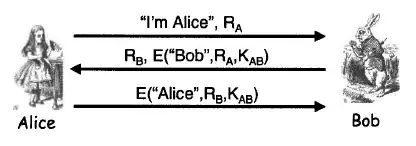I have read that a symmetric key cannot guarantee non-repudiation, but in Mark Stamp's book "Information Security: Principles and practice", he gives this strong mutual authentication protocol:
This protocol uses symmetric key, so my question is: This protocol can guarantee non-repudiation although it uses a symmetric key?
while reading the chapter it wasn't completely clear about this.
Thank you in advance for all your answers.
